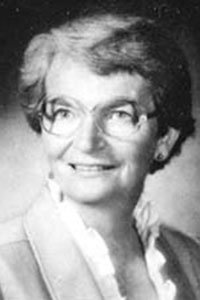
Eminent Homemaker
County: Lawrence
For some ranch wives, having a husband who works in town could have been a problem. For Emily Jennings, rural Spearfish it was an opportunity.
From the time she was small, Emily Ham Jennings was emblazoned with the idea that she could do anything she set her mind to doing. And she does just that: she takes care of the sheep and cattle, swaths, bales, irrigates and builds corrals. "Learning keeps me humble but the work provides a challenge," she said. "We all have to do what we have to do."
In 1962 the Jennings' moved to their farm in Spearfish Valley. The farm gave the kids something to do. They had to work to keep the farm in operation - and that work made some happy times.
The eldest son, David, excelled in riding and tending the cattle; he was graduated from South Dakota State University with an animal science degree and is now a farmer in Montrose. Bruce worked with the farm's irrigating system and is now an engineer in Rock Rapids, Iowa. The only daughter, Laraine, worked with the animals and is a nurse at the State Veterans' Home in Hot Springs. Eric, the youngest child and an ag education major at SDSU in Brookings, is in charge of haying. The Jennings' work together.
Along with operating the farm, Emily is active in community service. To date she has held most offices within her local Lower Valley Women's Club, was county chairman and district secretary. For two years she served on the SDSU Home Economics Advisory Board which advises the College of Home Economics and the Extension Home Economics program at SDSU. She was named Little International Honored Homemaker in 1982.
Emily sees her life as one filled with peace. She feels no loss for her own time when she helped with the hospital fund drive, served on the fair board, hosted a live-in foreign student or supported Laraine's activities in Job's Daughters. She remains active in PEO and the United Methodist Church.
She displayed the same determination while her children were in 4-H. "It's a good program for kids," she said. "Our four children were not necessarily good competitors but they learned to do something for themselves, to show their exhibits and either do a good job or become motivated to learn to do better."
All four of the Jennings showed sheep in 4-H. Emily feels strongly about the value of sheep and the economics involved. Sheep provide two bases of cash flow each year: both wool and lamb crops.
Her interest in sheep goes even further for herself. She raises and markets the animals, cards, spins the wool into yarn and then knits mitten liners and sweaters for the family.
Emily said, "I've had a lot of opportunities dropped in my lap because Jim was working at the bank during the day. Yes, I guess I've had some responsibility for the farm, but I've always had Jim's support in what I did." Jim added, "We wouldn't have this farm without her. She sacrificed her own time and never demanded nor pushed. She has learned to effectively manage time and resources - and both our family and the community have benefited."

